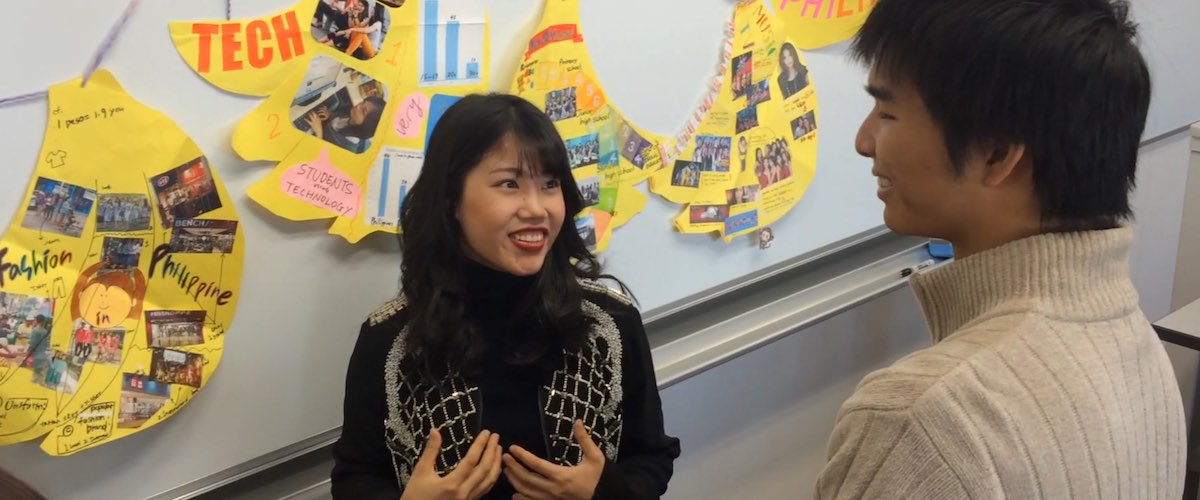CS: Presentation
L( )、Kambara (神原)、Salonga(サロンガ)、 Backwell (バックウェル)、Connell (コネル)、Ford (フォード)
(前期) 火3・火4・水1・木3・木4・金3 /(後期) 火3・火4 ・水1
These courses, taught entirely in English, focus on developing the core skills students need in order to perform in a variety of oral communication settings (presentation, conversation, drama, discussion). These include verbal and nonverbal communication skills, as well as presentation strategies.
There are seven different presentation courses to choose from based on different themes and levels!

Issues and Solutions
( )
(前期) 火3、火4、水1 /(後期) 火3、水1
Key Words: Issues, Critical Thinking, Presentation Styles
In this class, we will aim to focus on different issues and the solutions provided globally and locally. We will learn to think critically about things surrounding us and express our observations and opinions clearly with good organization. We will use TED Talks in class to discuss important topics, understand and evaluate different presentation styles, and practice verbal and nonverbal communication skills. At the end of this course, you will be more organized in your thoughts, express more confidently, and use natural and fluent English in your presentations.
Student Comments:
In this class, you can know how to make a presentation. Teacher teaches basic knowledge of presentation. So, if you are not good at speaking English, you don't have to feel nervous. You can enjoy studying English presentation.
Giving Interesting Presentations
Kambara (神原)
(前期) 火3、火4、水1、木3 /(後期) 火3・火4
Key Words: Presentation skills, Public speaking, Confidence
Public speaking makes many people nervous. This course will help students develop their speaking skills and stage presence so that they can give interesting and engaging presentations. Participating in group discussions is one way to present your ideas to others, so we will begin with that. Then, we will start working on giving presentations.

Speeches that Changed the World
Salonga (サロンガ)
(前期) 火3・火4 (後期) 火3
Key Words: communication skills, presentation skills, visual aids
This section focuses on communicating with others. Students will learn to make presentation stories and visual and physical messages more effective. Teaching references include speeches of world leaders and humanitarian ambassadors that changed the world. In addition, the students will learn about the United Nations (UN) Sustainable Development Goals (SDGs) and their connection to their chosen presentation topics. The classroom time will be mostly spent actively using English, one-on-one, in small groups, or in front of an audience. A typical lesson will begin with a short warm-up activity followed by the main activity. Main activities vary weekly and may include discussions, presentations, or communication skill-building activities.

Dynamic Advanced Presentation
Backwell (バックウェル)
(前期) 火3、火4 、木4(後期) 火4
Key Words: Communication Skills, Active Listening, Self-chosen Topics
Learn to communicate like a God! In this course you will choose exciting presentation topics and learn how to make compelling presentations. You will discover how to catch your listeners’ attention from your first sentence and hold their attention to the end. Furthermore you will gain “audience skills” where you learn to listen deeper, ask good questions and get something useful from even a boring presentation. There are many reasons to study at university. One good reason is to become a better communicator. That’s what you will learn in this class.
Student-led Seminars: Present and Discuss
Connell (コネル)
(前期)火3・火4、水1、金3 /(後期) 火3・火4
Key Words: Student-led seminars, Presentation and discussion, Local and global issues
In this course, you will work individually and in teams to prepare seminars about topics and issues that you are interested in. For each seminar, you will give a presentation, then lead small-group discussions with the class. We will practice communicating clearly with presentation and discussion skills and explore ways to design slides that are easy to look at. There will also be time to work with your team to prepare the seminars. By the end of the course, you will have more confidence to express your thoughts in front of others and have meaningful discussions in English.

Storytelling and Drama
Ford (フォード)
(前期) 火4/(後期) 火3・火4
Key Words: Communication, Performance, Storytelling, Drama, Oral Interpretation
This section will focus on the practice of communication and presentation skills through storytelling and the use of methods and strategies from speech, drama, and the arts, with activities such as oral interpretation and reader's theater, as well as the use of authentic English materials from music, poetry, and literature as content for study. Practice and performance in this way will stimulate and motivate you to use English as well as strengthen your overall communication skills and confidence in English!
Student Comments:
I learned that it is more important to think deeply than to speak English well. However well a person may speak English, he can't give a good speech without thinking deeply.